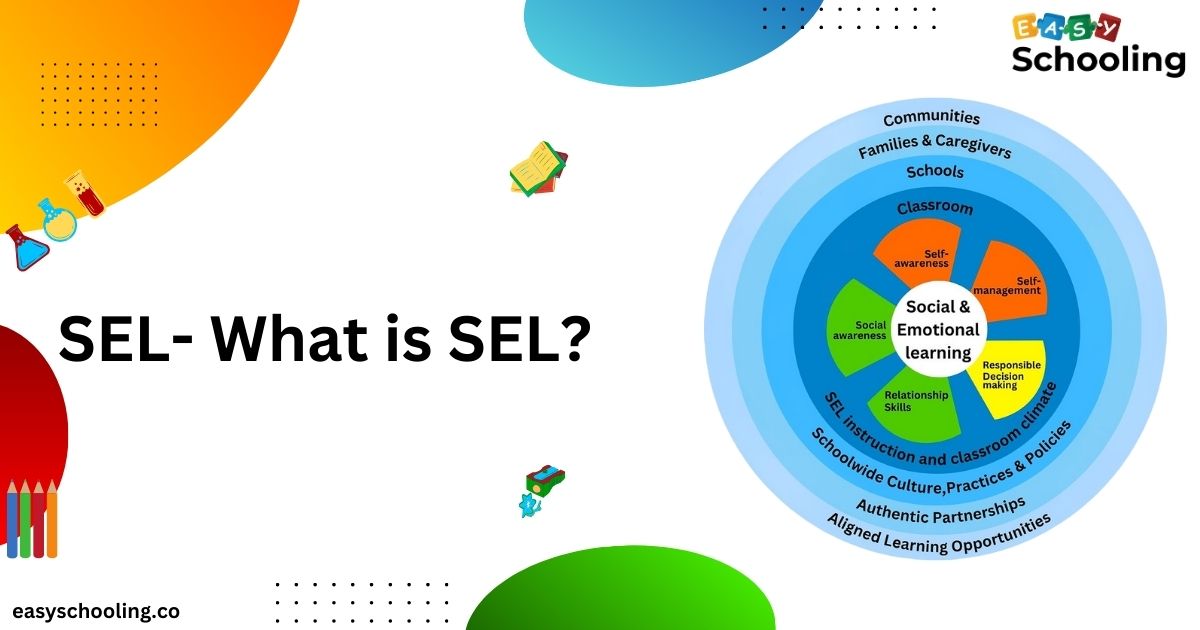Social Emotional Learning, commonly abbreviated as SEL, refers to a crucial framework encompassing the processes through which individuals understand and manage emotions, set and achieve positive goals, feel and show empathy for others, establish and maintain positive relationships, and make responsible decisions. This holistic approach focuses on nurturing essential life skills that empower individuals to effectively handle various life challenges, cultivate healthy relationships, and navigate the complexities of the modern world.
The Core Components of SEL
Self-Awareness
Self-awareness constitutes the foundation of Social Emotional Learning. It involves recognizing one’s emotions, thoughts, values, and strengths. Through practices like mindfulness and reflection, individuals develop a deeper understanding of themselves, fostering a sense of identity and confidence.
Self-Management
Self-management revolves around the ability to regulate emotions, thoughts, and behaviors in different situations. Techniques such as stress management, impulse control, and motivation strategies aid in cultivating resilience and adaptability.
Social Awareness
Social awareness emphasizes understanding and empathizing with others, appreciating diverse perspectives, and fostering a sense of community. This component involves developing empathy, recognizing social cues, and cultivating a respectful and inclusive mindset.
Relationship Skills
Relationship skills encompass effective communication, cooperation, conflict resolution, and teamwork. Developing healthy relationships, understanding boundaries, and collaborating with others are pivotal aspects of this component.
Responsible Decision-Making
Responsible decision-making involves making ethical, constructive choices about personal and social behavior. Critical thinking, problem-solving, and considering the well-being of oneself and others are integral to this facet of SEL.
The Importance of SEL in Education
In educational settings, SEL plays a pivotal role in nurturing well-rounded individuals. Integrating SEL into the curriculum promotes a positive school climate, enhances academic achievement, and equips students with essential life skills crucial for success in both personal and professional spheres.
Academic Achievement and SEL
Numerous studies have highlighted the correlation between SEL and academic success. Students who engage in SEL practices show improvements in focus, self-discipline, and overall academic performance. By fostering emotional regulation and resilience, SEL contributes significantly to creating conducive learning environments.
Social and Emotional Development
Beyond academics, SEL fosters the development of essential social and emotional skills crucial for navigating life challenges. Children and adolescents equipped with these skills exhibit improved communication, empathy, and conflict resolution abilities, laying the groundwork for healthier relationships and personal well-being.
SEL Implementation Strategies
Classroom Practices
Educators play a pivotal role in implementing SEL strategies. Incorporating SEL practices into daily routines, such as morning meetings, reflective journaling, and collaborative activities, creates opportunities for students to develop social and emotional competencies.
Collaborative Learning Environments
Encouraging collaborative projects, group discussions, and peer-to-peer interactions fosters an environment conducive to SEL growth. Such activities facilitate the development of teamwork, empathy, and communication skills among students.
Parental Involvement
Incorporating SEL into the broader community is equally vital. Engaging parents and caregivers in SEL workshops, providing resources for home-based SEL activities, and fostering open communication channels contribute to holistic skill development in children.
Advantages of Prioritizing SEL
Emotional Regulation
SEL equips individuals with the ability to understand and manage their emotions effectively. By fostering emotional regulation, individuals can navigate stressful situations with resilience, leading to improved mental health and well-being.
Improved Communication Skills
An essential facet of SEL is the development of strong communication skills. Individuals proficient in SEL practices tend to express themselves more clearly, actively listen to others, and communicate their needs and emotions effectively.
Enhanced Empathy and Understanding
Social Emotional Learning nurtures empathy and understanding towards others. This skill is vital in fostering inclusive and supportive communities, where individuals respect and value diverse perspectives.
Conflict Resolution and Decision-Making
SEL empowers individuals with the tools necessary to handle conflicts constructively. Through responsible decision-making, individuals can navigate complex situations by considering multiple viewpoints and making informed choices that benefit themselves and those around them.
Implementing SEL Beyond Education
Workplace Environment
The principles of SEL are not confined to educational institutions. Employers recognize the significance of social and emotional skills in the workplace. Companies that prioritize SEL initiatives witness improved teamwork, reduced conflicts, and enhanced employee well-being, leading to increased productivity and job satisfaction.
Community Engagement
Beyond academic and professional settings, fostering SEL in communities contributes to creating a more compassionate and harmonious society. Engaging in community-driven SEL initiatives promotes empathy, understanding, and a sense of collective responsibility towards societal issues.
See More: The Evolution of Online Teaching Platforms
Challenges and Opportunities of SEL
Overcoming Implementation Barriers
While the benefits of SEL are evident, challenges in implementation persist. Limited resources, varying levels of educator training, and the need for consistent support pose hurdles. However, investing in professional development, advocating for policy changes, and leveraging technology can help overcome these challenges.
Embracing Technological Advancements
Technology offers vast opportunities to promote SEL. Innovative tools, such as educational apps, virtual reality experiences, and online platforms, can complement traditional methods, making SEL more accessible and engaging for diverse audiences.
Conclusion: The Ongoing Importance of SEL
In summary, Social Emotional Learning (SEL) is a comprehensive framework that nurtures essential life skills crucial for personal development and success. By emphasizing self-awareness, self-management, social awareness, relationship skills, and responsible decision-making, SEL equips individuals with the tools necessary to navigate various life challenges effectively.
Integrating SEL into educational settings not only enhances academic performance but also fosters social and emotional well-being. Educators, parents, and communities play instrumental roles in promoting SEL and creating environments that facilitate the growth of these critical skills.
Investing in Social Emotional Learning is an investment in the holistic development of individuals, preparing them to thrive in a diverse and ever-evolving world. Learn more from EasySchooling.co.
